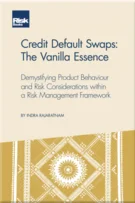Conduct & Culture
Ariane Chapelle, Jimi Hinchliffe and Mark Laycock
Conduct & Culture
Introduction
Operational Risk in Four Letters
An Invisible Framework
Small is Beautiful in OpRisk Management
The Business Value of ORM
How to Minimise ‘People Risk’
The Missing Piece
Risk Appetite and Framework
From Russian Roulette to Overcautious Decision-making
The Importance of Preventive KRIs
How to Build Preventive Key Risk Indicators
Unlocking KRIs
Six Steps for Preventive KRIs
Have Your Cake and Eat It
Conduct, Not ‘Conduct Risk’
How to Manage Incentives
Is Reputation Risk Overstated?
What Regulators Want
Conduct & Culture
OpRisk Takes Forward Steps at OpRisk Europe 2014
Modern Scenario Analysis
The Rogue’s Path
Rogue Trading No Training: The Connections
What Brexit Teaches OpRisk
OpRisk Survey Shows the Insidious Effects of Political Risk
Discarding the AMA Could Become a Source of OpRisk
UCL Research Shows that SMA Reforms Introduces Capital Instability and Discourages Risk Management
Memo to Bank CEOs: Treat OpRisk with More Respect
Don’t Let the SMA Kill OpRisk Modelling
Conduct management and corporate culture are closely intertwined. Both require a holistic approach; they both relate to every component of an operational risk management framework and are most effectively managed as integrated features of the framework rather than a stand-alone risk type. The Institute of Operational Risk is preparing its long-awaited Sound Practice Guidance on Conduct.
CONDUCT FAILURES AND THE CREATION OF THE FCA
The creation of the Financial Conduct Authority (FCA) on 1 April 2013 elevated conduct to the front page of financial newspapers and the board agenda of every bank. The creation of the FCA followed a series of scandals, including mis-selling of PPI and interest rate swaps, and in the wholesale markets, the manipulation of benchmarks such as LIBOR. The analysis of the Global Financial Crisis (GFC) shed light on misconduct and supervisory failures by senior managers and regulators alike.
Conduct issues are not new. Indeed ‘conduct of business’ has been an important part of the regulatory lexicon in the UK for decades, typically managed by compliance functions. The focus was on complying with regulatory rules on dealing with customers, including
Copyright Infopro Digital Limited. All rights reserved.
As outlined in our terms and conditions, https://www.infopro-digital.com/terms-and-conditions/subscriptions/ (point 2.4), printing is limited to a single copy.
If you would like to purchase additional rights please email info@risk.net
Copyright Infopro Digital Limited. All rights reserved.
You may share this content using our article tools. As outlined in our terms and conditions, https://www.infopro-digital.com/terms-and-conditions/subscriptions/ (clause 2.4), an Authorised User may only make one copy of the materials for their own personal use. You must also comply with the restrictions in clause 2.5.
If you would like to purchase additional rights please email info@risk.net









